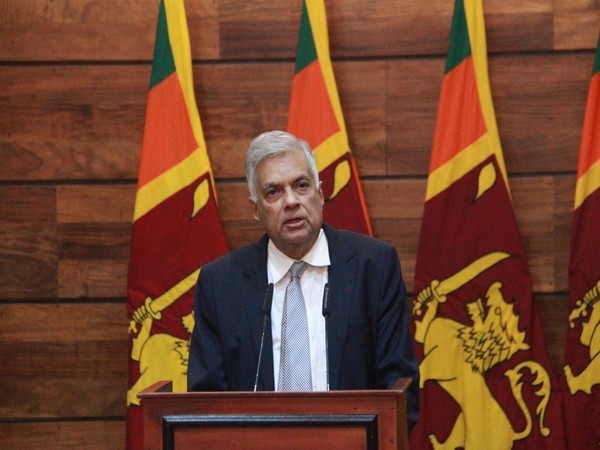
Ranil Wickremesinghe, the president of Sri Lanka, who is in town, stated on Friday that he thinks India’s development will be good for the neighbourhood and the Indian Ocean region (IOR).
Today, Wickremesinghe and Prime Minister Narendra Modi had bilateral discussions at the delegation level, and as a result, India and Sri Lanka adopted a vision statement to further strengthen their economic partnership.
Following the talks, the president of Sri Lanka issued a statement to the media in which he said, “I have congratulated Prime Minister Modi on the great strides India continues to make under his leadership in economic infrastructure and technological progress in ensuring growth and prosperity for the people of India.”
He continued, “We think that India’s growth will be good for the neighbourhood and the Indian Ocean region.
The President of Sri Lanka expressed his “profound appreciation” for India’s solidarity with and assistance to Sri Lanka during the previous year, which he termed as “undoubtedly one of the challenging periods” in Sri Lanka’s modern history.
Documents on animal husbandry, renewable energy, development initiatives in the Trincomalee district of eastern Sri Lanka, and online payment services between India and Sri Lanka were exchanged between the two parties.
Both nations signed a joint declaration of purpose regarding animal husbandry. The two nations exchanged an MoU of cooperation in the area of renewable energy. For the purposes of project economic development in the Trincomalee district, a Memorandum of Cooperation was signed. Additionally, India gave Sri Lanka the energy permit papers for the Sampur solar power project.
According to Wickremesinghe, “We agreed that the India-Sri Lanka Economic and Technology Cooperation Agreement is vital to promote the bilateral trade and investment in new and priority areas.
It will guarantee Sri Lanka a cheap and dependable supply of energy resources, he said, adding that “PM Modi and I believe that the construction of a multi-project petroleum pipeline from the southern part of India to Sri Lanka will do just that.”
The Sri Lankan President stated, “I have also informed Prime Minister Modi of the unprecedented obstacles that Sri Lanka has faced in the last year in terms of economic, social, and political dimensions, as well as of the reform initiatives I have pushed on a number of fronts in overcoming these challenges.
He also expressed his gratitude to PM Modi for the kindness shown to him and his delegation.
In addition, Wickremesinghe claimed that Prime Minister Modi had voiced his support and goodwill for Sri Lanka’s efforts to achieve economic recovery that would lead to stable, sustainable growth characterised by justice and equity.
He claimed that better connectivity will be the key to the future economic collaboration between India and Sri Lanka.
The aim of an economic cooperation between India and Sri Lanka would be realised in large part thanks to technological connections.
The President of Sri Lanka stated that the recent restart of the Chennai and Jaffna flight service was a significant step towards air connectivity.
The two nations recently announced the launch of passenger ferry services between Kankesanturai in Sri Lanka and Nagapattinam in Tamil Nadu.
The ferry services connecting Talemana, Ramesvaran, Nagapattinam, and Kankesanturai, according to the president of Sri Lanka, will boost maritime trade between the two nations. Studying the additional connectivity between Sri Lanka and India may help to further stimulate economic growth.
He expressed his appreciation for India’s assistance in providing citizen-centric services and services driven by digital technology, and he noted that improved connection will be essential to bolstering the partnership in tourism, people-to-people exchange, and cultural linkages.
India is currently Sri Lanka’s biggest market for foreign tourists, according to Wickremesinghe.
Among the agreements between the two nations revealed today were network-to-network agreements for UPI acceptance in Sri Lanka. Wickremesinghe remarked, in reference to the online payment system, “Enabling UPI-based digital payments in Sri Lanka would immediately facilitate future growth in this and other sectors.”
Additionally, India and Sri Lanka explored ways to strengthen their collaboration in the dairy and animal husbandry sectors in order to realise their shared goals in advancing socioeconomic development and improving peoples’ nutritional status.
“I am confident that the discussion we had today will lay the foundation for the next 25 years of Indo-Lanka relations and contribute to my vision for sustainable growth, national unity, and reconciliation for all segments of the people of Sri Lanka, as well as a prosperous and secure future for the people of India and Sri Lanka,” Wickremesinghe said.
PM Modi invited the Sri Lankan President to visit India for two days.
The Hyderabad House was the location of the bilateral discussions.
Sri Lanka, according to PM Modi, is a crucial ally in India’s “Neighbourhood First” programme and Vision SAGAR.
“Today, we discussed our opinions on matters that are bilateral, regional, and global. The development and security objectives of India and Sri Lanka are interwoven, according to us,” Prime Minister Modi said in a joint statement following their private discussions.
The close ties that have existed between the two nations since Wickremesinghe’s visit have been strengthened. The Union Minister of State for External Affairs, V Muraleedharan, welcomed the Sri Lankan President when he arrived in New Delhi on Thursday.

















